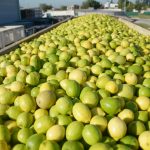U.S. ban on 'forced labor' imports does not target specific countries or products

Trade press reports emerged last week claiming a new U.S. act targeting slave labor could implicate Argentine blueberries - a claim that is categorically untrue.
The Trade Facilitation and Trade Enforcement Act was signed by the Obama Administration in late February, closing a loophole that to date has limited investigations into allegations of child or forced labor activity in the production of items imported by the United States.
The limitation was in the Tariff Act 1930 through what is called the "consumptive demand exemption", whereby calls for Customs and Border Protection (CBP) to investigate claims can be nixed, but the new act removes this language.
Dutch news aggregator Freshplaza linked the ban with a Labor Department list of 350 products allegedly produced with slave labor, although as far as produce is concerned - and there are many alleged cases from a range of countries on the department site - items are mostly listed in the 'child labor' category and not the 'forced labor' category.
In email correspondence with www.freshfruitportal.com, CBP declined to comment on whether the same legal changes would apply to investigations into child labor, or whether it expected the law would have any impact on fruit and vegetable traders.
However, Florida-headquartered Crowley Maritime Corporation published a release claiming the new prohibition did not target specific countries or products, but rather allowed CBP to investigate if an imported good is alleged to have been made using forced labor.
"The new prohibition DOES NOT target any specific countries or products, and DOES NOT immediately ban the import of any products," Crowley said.
"Moving forward, CBP will investigate allegations that a specific imported product was made using forced labor.
"These investigations may be initiated by CBP or in response to petitions submitted by the public (such as by human rights groups). Petitioners must prove that forced labor is taking place on a particular factory or farm and trace the tainted product to a particular shipment entering a U.S. port."
Following an investigation, any products found to be made in whole or in part using forced labor will be subject to exclusion and/or seizure, and may lead to investigation of an importer.
"CBP and public interest groups are likely to look for “leads” in the U.S. Department of Labor’s List of Goods Produced by Child Labor or Forced Labor and List of Products Identified by Executive Order 13126," Crowley said.
"These lists DO NOT ban the import of any of these products into the United States. Rather, they identify categories of products by country that the United States has reason to believe are at risk of having been produced by child or forced labor.
"This development will place additional pressure on importers to develop compliance systems for their supply chains, including identification of items potentially made with forced labor."














































